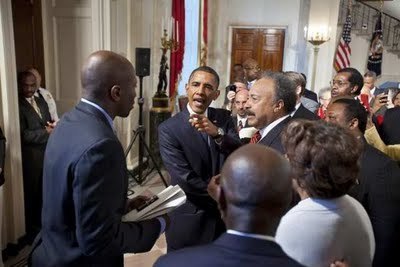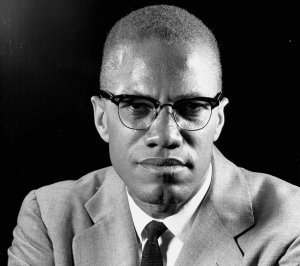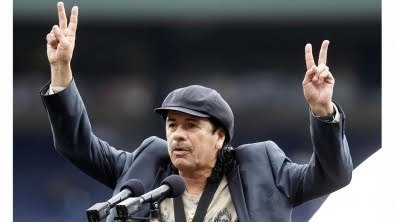Mark Anthony Neal's Blog, page 1085
May 22, 2011
May 20, 2011
Obama and Black Americans: the Paradox of Hope
 Obama and Black Americans: the Paradox of Hope
by Gary Younge | The Nation
Obama and Black Americans: the Paradox of Hope
by Gary Younge | The NationWhen Barack Obama was pondering a run for the presidency Michelle asked him what he thought he could accomplish. He replied,"The day I take the oath of office, the world will look at us differently. And millions of kids across this country will look at themselves differently. That alone is something." His victory was indeed something. The world certainly looked at America differently, though this had as much to do with who he wasn't—George W. Bush—as what he was, black, among other things.
Polls show that African-Americans indeed look at themselves differently. A January 2010 Pew survey revealed huge optimism. The percentage of black Americans who thought blacks were better off than they were five years before had almost doubled since 2007. There were also significant increases in the percentages who believed the standard-of-living gap between whites and blacks was decreasing.
But for all the ways black America has felt better about itself and looked better to others, it has not actually fared better. In fact, it has been doing worse. The economic gap between black and white has grown since Obama took power. Under his tenure black unemployment, poverty and foreclosures are at their highest levels for at least a decade.
Millions of black kids may well aspire to the presidency now that a black man is in the White House. But such a trajectory is less likely for them now than it was under Bush. Herein lies what is at best a paradox and at worst a contradiction within Obama's core base of support. The very group most likely to support him—black Americans—is the same group that is doing worse under him.
Read the Full Essay @ The Nation
Published on May 20, 2011 06:17
Malcolm X: Amiri Baraka, Michael Eric Dyson & Herb Boyd Recall
Democracy Now | with Amy Goodman
Manning Marable's Controversial New Biography Refuels Debate on Life and Legacy of Malcolm X
After two decades of work, Dr. Manning Marable completed a new biography, Malcolm X: A Life of Reinvention. Dr. Marable used material for his book that was recently made available, thus providing a new insight into the famed civil rights leader. His biography, however, has also refueled the debate on many controversial aspects of Malcolm X's life and interpretation of his politics and legacy. To discuss Dr. Marable's biography, we host a roundtable discussion with three guests. Amiri Baraka is an acclaimed poet, playwright, music historian and activist based in Newark, New Jersey. Herb Boyd is a Harlem-based activist, teacher and author who edits the online publication, The Black World Today, and writes for several publications, including Amsterdam News. Michael Eric Dyson is a professor of sociology at Georgetown University and is the author of numerous books, including Making Malcolm: The Myth and Meaning of Malcolm X.
Published on May 20, 2011 06:02
May 19, 2011
We Are Malcolm X
 We Are Malcolm X by Lamont Lilly
We Are Malcolm X by Lamont Lilly"It is incorrect to classify the revolt of the Negro as simply a racial conflict of black against white, or as a purely American problem. Rather, we are today seeing a global rebellion of the oppressed against the oppressor, the exploited against the exploiter."—El-Hajj Malik El-Shabazz, 1964
Brief, yet exhaustive, the following passage best represents the Malcolm X America doesn't want you and I to know—the more complete post-Mecca Malcolm who could certainly once again ignite an entire nation if only he were properly revisited. It seems like just yesterday, as a young adolescent, that the life and times of Malcolm Little were resurrected through Spike Lee's 1992 cinematic production, Malcolm X. Bold, vivid and vulgar, Spike's production wasn't only a history book for the hood; it was the artistic catalyst of a new cool: the infamous black "X" hat.
How unfortunate though that such a revival was short lived among a generation of budding hip hoppers who were never lucky enough to meet George Wallace or Lincoln Rockwell—who were never exposed to the White Citizens' Council. What Spike's X did impress upon me however, was a martyr of resistance Mr. Charlie somehow failed to mention when I was in school. Not one time was I really taught of Malcolm X. And once I discovered him I clearly understood why. Could you imagine all the Black men America has incarcerated converting into disciples of Malcolm X, all the political prisoners? Why, the oppressed would have their own nation by now!
Malcolm's teachings were simple: Black is beautiful, love your roots, family and community, feed the mind and atone within—know thyself and the rest will follow. Though quite the humble type and gentle giant you might say, Malcolm was [The Hate That Hate Produced]; he did possess an unwavering commitment to Black liberation. And what's wrong with that? Was it true that Malcolm openly declared war against imperialism, colonialism and white supremacy? Damn right!! But understand that Brother Malcolm wasn't just a Negro leader, he was a global figure for the entire African Diaspora, for the working, for the poor and oppressed worldwide—an NOI (Nation of Islam) apostle turned international Pan-Africanist and Human Rights advocate.
Malcolm wasn't a racist, not even a "reverse racist," as often depicted, but he did love The People—his people and all people. And as for any institution, organization or government that wasn't for The People, yes, Malcolm called them out! To Brother Malcolm, one was either [for] the oppressed or [against] the oppressed, regardless of race or social class. He would tell you in a minute, "We got some Black devils running around here, too!" This from a man so complex, that at times, he would even check himself. To Malcolm, NO ONE was exempt from being accountable to the masses. No one was exempt from being accountable to the truth. Malcolm Little was the story of true redemption, a man who hated, learned to love, and then learned to re-love. That was Malcolm, a mercenary for justice unadulterated.
In James Baldwin's dagger of a memoir, No Name in the Street (1972), Baldwin meticulously dedicates five pages to Minister Malcolm—intimately reflecting upon their few interactions and the qualities of a man he fiercely admired. Even in disagreeing with certain points, one couldn't help but to marvel at such tenacious and articulate "plain talk," particularly from the lips of an ex-convict without even a high school diploma. But Malcolm was sharp—so sharp that long time veteran and Civil Rights organizer, Bayard Rustin, eventually refused to publicly debate with him. For not only was Malcolm an avid reader, he was equally the profound listener.
Brother Malcolm would take your own words and hang you with them if you weren't careful, especially when engaging enthusiastic integrationists as James Farmer (founder of CORE). Yet, unlike many of today's Uncle Tom Black spokesman, Malcolm never spoke and wrote to impress folk. This self-proclaimed "field negro" would instead communicate in a language all could understand—from the highest to the lowest—from the youngest to the oldest. What most formal academicians fail to realize, or better yet acknowledge, is that Malcolm was The People's Champ—a street prophet who could relate to Oxford University's most esteemed professors just as sincerely and effective as with Kenya's Revolutionary Wing, the [Mau Mau]. Malcolm would extend the common street hustler just as much dignity as he would Jomo Kenyatta, Patrice Lumumba or Kwame Nkrumah.
In examples as these, and in many regards, Malcolm was long before his time. While the majority of Black political figures of this era sought freedom and liberation through social inclusion—through public toilets and white hamburgers, it was Malcolm who charged Human Rights over Civil Rights—Workers' Rights over capitalism. Why, he even championed Women's Rights. You see, it was okay that our mothers and sisters march The Edmund Pettus—be sprayed with hoses and bitten by dogs, but to have an opinion and given a microphone was crossing the line at this time. Well, not so to Brother Malcolm. In organizing his OAAU (Organization of Afro American Unity), Malcolm systematically sought strong sisters who could play equal roles in planning and teaching, in helping to build a revolutionary movement. His adoration for women like Fannie Lou Hammer, Shirley Graham Du Bois and elder sibling, Ella Collins, was nothing short of a personal denouncement of male chauvinism. Indeed, Minister Malcolm would have loved Shirley Chisholm. He poignantly articulated upon his return from Ghana, Guinea and Algeria that "Africa will not be free until it frees its women."
I state the above to say this, brothers and sisters: more so now than ever, it will be critical amidst our mounting struggles that people of all nations thoroughly re-explore the full range of Malcolm's thoughts and analyses—his actions and his deeds—his personal evolution and stages of development; for many of his ideological building blocks are just as relevant today as they were in February of '65. While today we may have a 'dark man' in office, there's far too many in prison. Job loss and 'Urban Renewal' continue to wreak havoc; while pig brutality seems to have gone UP in the Black community, at least from Oscar Grant's perspective. Not to mention, the NAACP is back fighting resegregation, right here in Raleigh, the state capital. This is what Brother Malcolm was trying to get us to understand almost 50 years ago.
The beauty of Malcolm was that only he could represent the truth of the Black experience with such fury and eloquence—only he could dissect the brutality of American hypocrisy with such fearless clarity, with such an impenitent passion. With heart and mind, body and soul, he awoke the dead and led the army…from the front…in the street…in the rain…in the middle of the ghetto…right in front of Mr. Hoover and his COINTELPRO. In the end, Malcolm was me and Malcolm was you. Malcolm was 'The People' and the beat of our hearts, the one who came and gave life as he went—our Black Freedom Christ who dared to stand tall. We didn't lose Brother Malcolm; he gave himself—a shepherd of the sheep who gave himself. Thanks Brother Malcolm…Black lives on. I too am Malcolm X, the oppressed live on.
***
Lamont Lilly is a graduate student at North Carolina Central University in Durham, NC.
Published on May 19, 2011 06:28
May 18, 2011
(Barack) Matters: Debating the First Black President
From MSNBC:
Cornel West tells Ed why he made the inflammatory remarks about President Obama in an interview where he says Obama is "a black mascot of Wall Street oligarchs"; Melissa Harris-Perry pushes back on West's statements.
Published on May 18, 2011 06:25
Test Driven Educational Reform: A Desperate Response to A Society Rotting at the Core
 Test Driven Educational Reform:
A Desperate Response to A Society Rotting at the Core
by Mark Naison | Fordham Universityspecial to NewBlackMan
Test Driven Educational Reform:
A Desperate Response to A Society Rotting at the Core
by Mark Naison | Fordham Universityspecial to NewBlackMan The breadth of support for tying teacher evaluations to student test scores is something which cuts across all parts of the political spectrum. It is something which unites Barack Obama with Newt Gingrich, Bill Gates with the Koch Brothers, Andrew Cuomo with Scott Walker, and Al Sharpton with Glen Beck and Bill O'Reilly. While those of us who have spent our lives in the classroom regard this as ill-advised and counterproductive, it is important to examine why test driven educational reform is virtually the only policy initiative which commands this kind of bi-partisan support.
To do so, we have to take an honest look at what has happened to America's working class and poor in the last thirty years, particularly in those portions of the country which were once part of America's industrial heartland. Looked at from the vantage point of once proud industrial centers like Detroit, Baltimore, Buffalo, Newark, Bridgeport, Gary, Youngstown, and Philadelphia, the United States is a society literally rotting at the core. Whole stretches of these cities lay abandoned ever since their factories closed, with only piles of bricks and metals left as reminders of industries that once employed millions of people. Often, the only new building in the most decayed sections of these cities are schools and prisons, with the former often serving as recruiting grounds for the latter.
With more than 2 million people now in prison in the US--as compared to less than 400,000 in 1980-- and with over 10 million people having spent time in prison and been rendered virtually unemployable, there are huge stretches of urban America, and more than a few small towns, where the streets are filled with men, and more than a few women, who have no secure connection to the legal labor market and whose pessimism and despair creates an atmosphere that literally sucks the energy out of everyone around them.
As someone who has walked these streets, as well as driven through them in most of the above mentioned cities, it is hard not to feel like a whole section of the American population has been abandoned by their government. No one talks about these people, no one does anything for them, no one discusses the conditions they are living as problems central to the future of the society. Needless to say, these conditions have been immeasurably worsened by tax policies and industrial policies, adopted in the last 30 years, which have frozen working class incomes and concentrated wealth in the top layers of the society to an unprecedented degree.
So where does school reform come in? Some time during the last ten years, a broad spectrum of groups in American society, some of them elected officials and community organizers, some of them business leaders, decided that the way to bring America's most devastates communities into the economic mainstream was by radically transforming schools. If we somehow turned schools into places of energy and optimism, where young people learned skills necessary to compete in a global economy, then maybe the children of the poor could escape the fate of their parents and we could achieve a more equal society without changing tax policy or redistributing wealth.
It was an extraordinarily seductive vision. It appealed to parents and community leaders living in poor neighborhoods because it appeared to show, for the first time in decades, that the nation was willing to invest in the future of their children. It appealed to political conservatives because some of the reforms proposed--school vouchers and charter schools--involved the application of market principles to the public sector. And it appealed to the very rich, because it promised a path to greater equality that left the tax system that allowed them to acquire great wealth untouched.
In the beginning, school reform appeared to be a "win win:" for everybody. But after the first few years, when dramatic reforms, including vouchers and founding of charter schools, appeared to show few significant gains in test scores, or changes in the atmosphere of neighborhoods where the experiments took place, the discourse of reform started to center on the "problem of bad teachers." With cruel cynicism, reformers began arguing that their brilliant plans were being sabotaged by poorly motivated and recalcitrant teachers, and that elevating children out of poverty through schooling could only be effective if teachers were forced to work much harder and be fired if they refused to produce.
This conclusion resulted in a determination to use test scores, not just to rate the progress of students, but to motivate teachers and administrators. Across the nation, with the encouragement of educational foundations funded by some of America's wealthiest people, school systems began tying the salaries and careers of teachers and principals to the test scores of students they worked with, and began systematically attacking teachers unions for standing in the way of these motivational schemes.
When teachers resisted giving up seniority rights to allow such accountability plans to be put in place, they were demonized as the major obstacle, not only to educational reform, but to the achievement of economic and even racial equality. Public school teachers, and leaders of teachers unions, were lambasted in the media, and by public officials in Washington and State Capitals, as selfish and pampered. If school systems could replace teachers at will the way business did with employees when they didn't perform, than school performance would improve over night and the US would become economically competitive and egalitarian with one wave of the magic wand. The key was to constantly rate student learning by measurable criteria and determine the status of teachers, administrators and entire schools on the basis of such "data."
By the time Barack Obama was elected, the momentum of this accountability frenzy was well nigh irreversible.
There was only one problem. There was no place in the entire United States where such strategies achieved any of the intended results. There was not one school system in a low income community where test scores were significantly raised by tying teacher salaries and tenure to student test scores, nor was evidence anywhere that such reforms had a measurable effect on income distribution or economic development in depressed communities. To put the matter bluntly, if you applied the same accountability criteria to educational reformers that were are being used to rate teachers and principals, they would all be fired.
What test driven school reform turns out to be, when all is said and done, is an initially well intentioned, but now cruelly deceptive effort to reduce poverty and inequality without addressing any of its root causes in taxation, industrial policy and the distribution of funding for housing, health care and community economic development. Because of that, it can never succeed in achieving its professed goals, but along the way, it can suck the life out of schools and demoralize a generation of students and teachers.
In school systems around the country, that is exactly what it is doing.
***Mark Naison is a Professor of African-American Studies and History at Fordham University and Director of Fordham's Urban Studies Program. He is the author of two books, Communists in Harlem During the Depression and White Boy: A Memoir. Naison is also co-director of the Bronx African American History Project (BAAHP). Research from the BAAHP will be published in a forthcoming collection of oral histories Before the Fires: An Oral History of African American Life From the 1930's to the 1960's.
Published on May 18, 2011 06:07
May 17, 2011
Echoes of Feliciano: Carlos Santana Booed at Civil Rights Games

Santana is Booed for Using Baseball's Civil Rights Game to Speak Out for Civil Rights by Dave Zirin | The Nation
Major League Baseball's annual Civil Rights Game was poised to be a migraine-inducing exercise in Orwellian irony. Forget about the fact that Civil Rights was to be honored in Atlanta, where fans root for a team called the Braves and cheer in unison with the ubiquitous "tomahawk chop.
Forget about the fact that the Braves have been embroiled in controversy since pitching coach Roger McDowell aimed violent, homophobic threats at several fans. Forget that this is a team that has done events with Focus on the Family, an organization that is to Civil Rights what Newt Gingrich is to marital fidelity.
The reason Atlanta was such a brutally awkward setting for a Sunday Civil Rights setting, was because Friday saw the Governor of Georgia, Nathan Deal, sign HR 87, a law that shreds the Civil Rights of the state's Latino population. Modeled after Arizona's horrific and unconstitutional SB 1070, HR 87 authorizes state and local police the federal powers to demand immigration papers from people they suspect to be undocumented. Those without papers on request will find themselves behind bars. Civil rights hero, Atlanta's John Lewis has spoken out forcefully against the legislation saying "This is a recipe for discrimination. We've come too far to return to the dark past."
But there was Major League Baseball commissioner Bud Selig, celebrating civil rights in the Georgia, and chortling excitedly about the 2011 All-Star game in Arizona. In the hands of Selig, irony becomes arsenic. Thank God that Commisioner Selig was stupid enough to choose the Civil Rights Game to honor, among others, the great musician Carlos Santana. Santana was supposed to be the Latino stand-in, a smiling symbol of baseball's diversity. And maybe, he would even play a song!
But Bud picked the wrong Latino. Carlos Santana took the microphone and said that he was representing all immigrants. Then Santana added, "The people of Arizona, and the people of Atlanta, Georgia, you should be ashamed of yourselves." In a perfect display of Gov. Nathan Deal's Georgia, the cheers quickly turned to boos. Yes, Carlos Santana was booed on Civil Rights Day in Atlanta for talking about Civil Rights.
Read the Full Essay @ The Nation
Published on May 17, 2011 17:26
'Left of Black': Episode #34 featuring David J. Leonard and Natalie Y. Moore
Left of Black #34w/ David J. Leonard and Natalie Y. MooreMay 16, 2011
Left of Black host and Duke University Professor Mark Anthony Neal is joined via Skype by Washington State University Professor David J. Leonard, co-editor of Commodified and Criminalized: New Racism and African-Americans in Contemporary Sports. Later he is joined by Chicago Public Radio reporter Natalie Y. Moore, who is also the co-author of The Almighty Black P Stone Nation: The Rise, Fall and Resurgence of An American Gang.
***
>David J. Leonard is Associate Professor of Comparative Ethnic Studies at Washington State University, Pullman. He has written on sport, video games, film, and social movements, appearing in both popular and academic mediums. His work explores the political economy of popular culture, examining the interplay between racism, state violence, and popular representations through contextual, textual, and subtextual analysis. He is the author of Screens Fade to Black: Contemporary African American Cinema and the forthcoming After Artest: Race and the War on Hoop (SUNY Press).
>Natalie Y. Moore is a reporter for Chicago Public Radio's South Side bureau. Prior to joining the Chicago Public Radio staff in May 2007, Natalie was a city hall reporter for the Detroit News. As a freelance journalist, Natalie's work has been published in Essence, Black Enterprise, the Chicago Reporter, Bitch, In These Times, the Chicago Sun-Times and the Chicago Tribune. She is co-author of the book Deconstructing Tyrone: A New Look at Black Masculinity in the Hip-Hop Generation (Cleis Press, 2006) and The Almighty Black P Stone Nation: The Rise, Fall and Resurgence of An American Gang. She is an adjunct instructor at Columbia College Chicago and is the former program chair for the Association for Women Journalists.
***
Left of Black is a weekly Webcast hosted by Mark Anthony Neal and produced in collaboration with the John Hope Franklin Center at Duke University.
Published on May 17, 2011 07:46
Mark Anthony Neal's Blog
- Mark Anthony Neal's profile
- 30 followers
Mark Anthony Neal isn't a Goodreads Author
(yet),
but they
do have a blog,
so here are some recent posts imported from
their feed.



